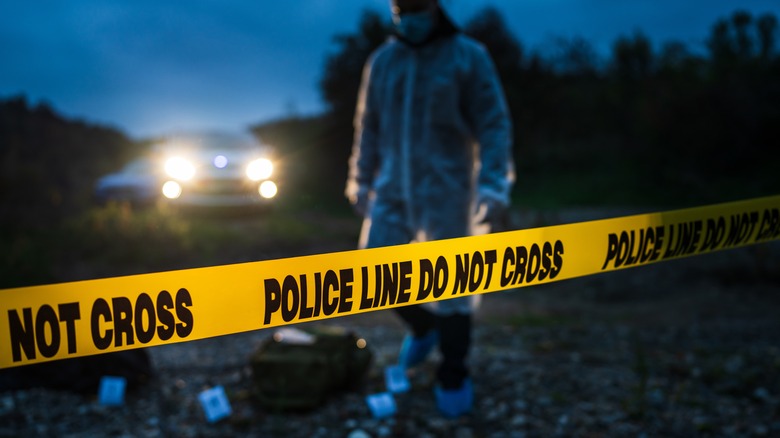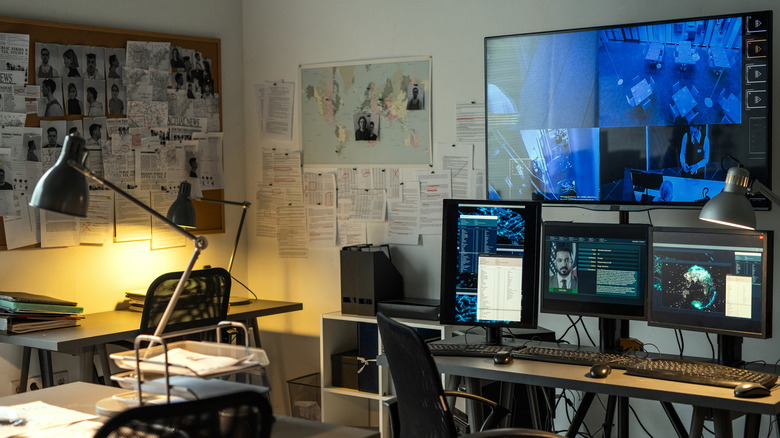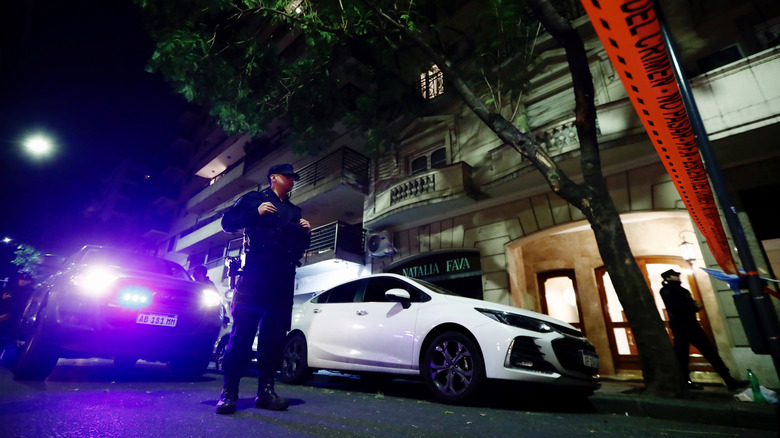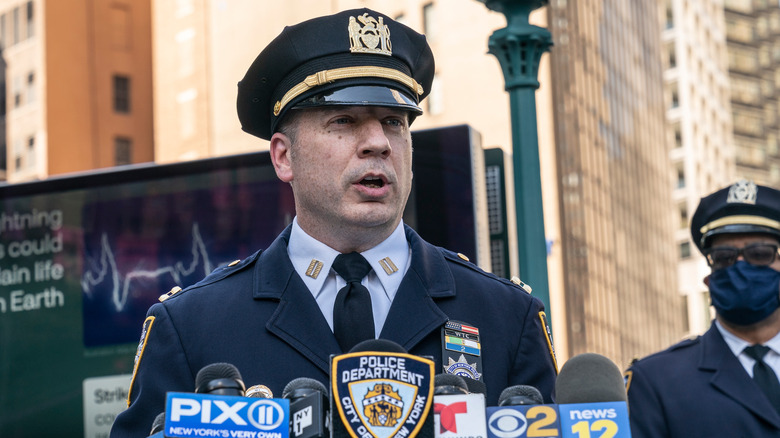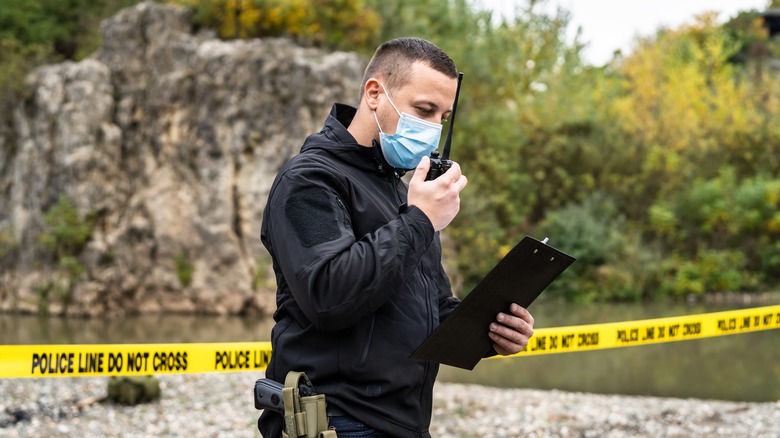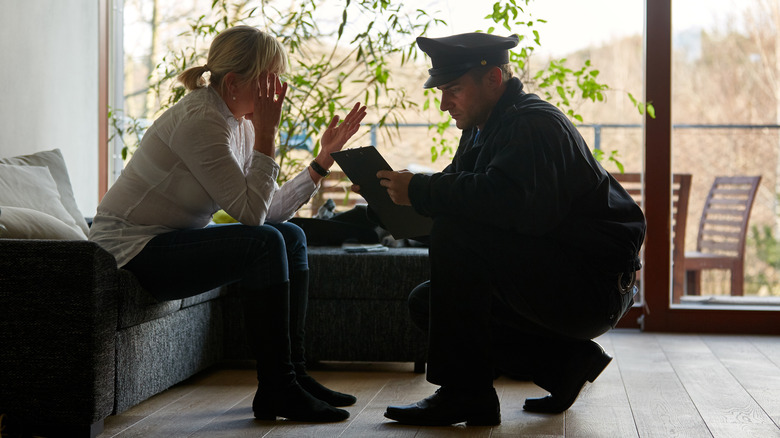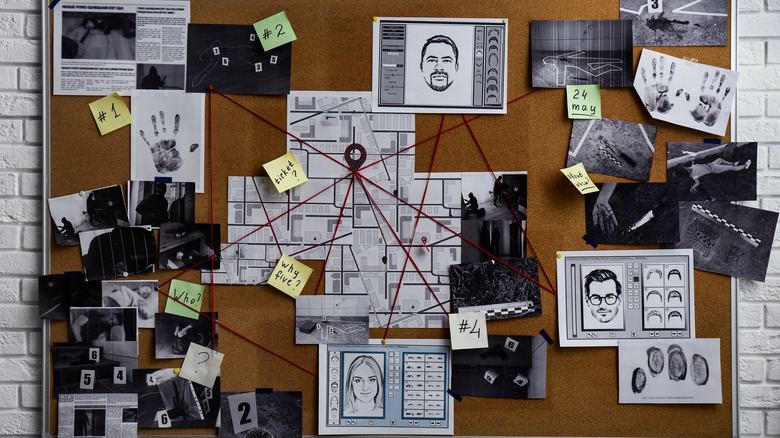What Life As A Homicide Detective Is Really Like
There are just about a million movies and shows following the lives of homicide detectives, from quirky dark comedies like "Knives Out" to long-time favorites like "Brooklyn 99" and "CSI." But they're not perfect mirrors of a homicide detective's life — very few shows accurately depict the slow, administrative side of the job, or the wide variety of tasks a homicide detective can (and has to) take. And if they do, they'll probably dramatize it for cinematic effect.
However, life as a homicide detective rarely needs cinematic dramatization — it's an extremely exciting, sometimes very dangerous but equally fulfilling career. As Maryland University explains, being a homicide detective is no easy job: It comes after Police Academy training, a bachelor's degree in criminal justice, and years of experience as a police officer. And even then, you have to apply for the position — not every officer becomes a homicide detective.
Homicide detectives are excellent team leaders (they've got a whole squad to command), conscientious team members (they still have many ranks above them), and masters in psychology (they have to get into the criminal's mind to catch them and get a confession). As former Detective Chief Inspector Simon Harding said (via Channel 4), "I've sat in front of people that look like me, that look like my mom ... But I've sat opposite people who are seriously dangerous." Every day is different, and every case comes with new challenges. So let's explore what life as a homicide detective is really like.
Work starts very early
When LAPD Detective Christopher Barling spoke to The Guardian in 2013, he explained that, first and foremost, being a homicide detective means working very early shifts and, at times, very long hours. A normal shift starts between 6-7 a.m., with the homicide detective talking to their squad over a cup of coffee and getting updates on all cases. Homicide detectives work 9/17 shifts: nine-hour days for nine out of 10 weekdays (with weekends off).
But having weekends off is not a luxury all homicide detectives can afford. Prospects confirms that being a detective in the United Kingdom often entails working off hours and varied shifts, and the Met Police explains that, while individual, cultural, and religious needs will always be considered, sometimes it's just not possible, since they are an emergency service and serving Londoners comes first.
Of course, if a homicide case is reported, the homicide detective has the responsibility to come to the crime scene, as per The Guardian. So, even if their shift has just ended, a new one begins with the new case. And when a homicide detective deals with a fresh murder case, they rarely get to go home when the clock strikes five.
There are two very different kinds of shifts
According to LAPD Detective Christopher Barling, there are two kinds of shifts a homicide detective can have (via The Guardian). On the one hand, there's the regular 9/17 shift: The squad gets together to discuss current cases and potential approaches, then, the detective supervisor delegates certain tasks to the officers and chooses who will be on call with them. After the morning debrief is over, the homicide detective supervisor reviews search warrants and court orders and handles various administrative jobs, from timesheets to overtime slips. And of course, if there are ongoing cases, the homicide detective will always stay in touch with the updates and decide the next moves.
On the other hand, there's a very different kind of shift. Barling said, "When a murder occurs it is rarely during business hours; it is usually between 10 p.m. and 3 a.m. So, on those days, my watch officially starts when I arrive at the crime scene." The homicide detective supervisor has to be among the first ones to arrive at the scene, so as to assign tasks to their squad: interviewing witnesses, finding surveillance footage, booking evidence, searching through criminal databases, re-canvassing the crime scene for more evidence, and meeting with specialized officers. Afterward, the homicide detective meets with their superiors to discuss the case, and sometimes, they also meet with gang intervention personnel to prevent a potential retaliation attack.
You're (still) being watched
Oftentimes, movies portray homicide detectives as cool, confident individuals who are in complete control of the investigation. But, even though homicide detectives earn their jobs after years of experience as officers, there are still several higher ranks above them. As per All Criminal Justice Schools, homicide detectives are only second in the police career ladder after police officers. Then, promotions can earn them higher ranks as follows: sergeant, lieutenant, captain, commander, deputy chief, and chief of police. But should detectives be seeking promotions, they will be closely observed by their superiors, and sometimes, by their squad, too.
Former Detective Chief Inspector Simon Harding confirms that particularly your first few jobs as a homicide detective can be very intimidating, as you're being watched by several seasoned members of the police force (via Channel 4): "You should be battling at the top of your game ... 'I hope they think I'm going to do a good job.'" But the scrutiny doesn't stop after the first jobs. 60 Minutes tells the very relevant story of former Detective Gary Jubelin — he was a top dog of Australian police, having solved giant cases and putting dozens of notorious criminals behind bars. But after he was seen illegally recording conversations with suspects, he was fired — his illustrious career did not put him above the law, and it goes to show that homicide detectives are never really left to their own devices.
One small case can lead to a viper's nest
Perhaps one of the most interesting aspects of being a homicide detective is that you never know where a murder case might lead you. As 60 Minutes reports, sometimes, a homicide detective takes on a seemingly banal case, only to realize it's a tiny piece of a big puzzle. Around the turn of the 21st century, former homicide detective Gary Jubelin discovered a gruesome crime scene: A body had been hacked into eight bits and thrown into the Hastings River in Australia. The body was identified as Terry Falconer. He was a local drug dealer, and Jubelin went on to follow the trail of crimes that surrounded him and the narcotics gang he was involved in.
Jubelin eventually uncovered a huge network of organized crime. Over the following decade, he arrested 14 people for over 100 offenses. It culminated with the arrest of kingpin Anthony Perish — Jubelin managed to take down an entire viper's nest of crime. He commented about Falconer's murder: "It was a detective's dream in that it had every twist and turn that you would expect of an organized crime type murder."
Sometimes, you have to deal with the media
It's not just fictitious movies about homicide detectives that are highly popular. As Zenger confirms, reality TV shows that follow actual detectives are also seeing a rise in popularity. Homicide Detective Jason White, who appeared on "The First 48," explains that this is quite common now, at least in the United States. "Do I think a show like 'The First 48' is a show that you're going to see on TV? The answer is, yes, because ... murder is fascinating to most people. I find it fascinating," he said. As IMDb confirms, "The First 48" has been running since 2004. Homicide detectives have the opportunity to work with filming crews, and there is
As reality TV suggests, there's a chance detectives will be recorded while carrying out crucial tasks in the investigation, like talking to witnesses or getting updates from their squad. So they need to be prepared for communicating with directors, producers, and members of the filming crew. And as the pressure to catch the killer increases, the detectives need to stay level-headed and do their job as if no one is filming.
You keep contact with the victim's family
One of the trickiest parts of a homicide detective's job is having to talk to the victim's family. As retired MPD detective Mitch Credle explains, homicide detectives have the daunting task of informing a family their loved one has been murdered (via Cop Stories). "Walking up them steps, knocking on that door, you felt like the Grim Reaper," he said. Sometimes, the families expect to hear the bad news. But other times, it's a complete surprise, and homicide detectives have to be reassuring during their emotional breakdown.
Former homicide detective Simon Harding also explains (via Channel 4): "[It's] very difficult for a family to comprehend firstly that they have lost somebody but in that way ... It's not just about their death, it's in the way in which they died." But Harding says, no matter how gruesome the end they met, the victim's family has to know the truth. It's much better for the family to hear the truth from the detective, rather than from the news, or when (and if) the case goes cold. Having an honest relationship with the family helps them better cope with the tragedy, and most homicide detectives take great pride in solving cases for the families, notes The Guardian. "These days [when a suspect is convicted] are special because we can then explain to a family that we know who is responsible for killing their loved one," says LAPD detective Christopher Barling.
It doesn't end with the arrest
It's a rewarding moment for a homicide detective to make an arrest. But the investigation doesn't end there — first of all, after an arrest has to come a confession if the suspect is indeed guilty. And if there isn't a confession, a detective should gather enough evidence to convict the suspect. Then, if there's a trial, many homicide detectives decide to stick around all the way to the end. Oklahoma Detective Jason White explains why (via Zenger): "I try to make it to every single one of my court cases in reference to closing arguments. I'll wait around with the family oftentimes until they come back with a verdict. I try to hang out with them until this thing is finally put to rest."
Indeed, when taking on a homicide case, detectives are doing the work on behalf of the victim's family. And there is no justice for the family until there's a conviction. LAPD Detective Christopher Barling said (via The Guardian), "If I am to use an old cliché, as homicide detectives we get to speak for the dead." During the trial, homicide detectives can do this by testifying against the suspect and helping the prosecution confirm the necessary evidence needed to convict them.
Conducting a murder investigation means very varied work
A homicide detective can work a single murder investigation or several, in various stages of development. As LAPD detective Christopher Darling explains to The Guardian, he's always on call, working cases as they come in.
All Criminal Justice Schools explains the many kinds of tasks a homicide detective can do during a murder investigation. During the first two or three days, the detective analyzes the crime scene and canvases it for evidence and witnesses. Then, they have to meet the coroner and understand the cause of death (also confirming that it's indeed a murder). Afterward, the detective helps gather such things like CCTV footage or reviews the footage collected by their squad.
Homicide detectives are also in charge of interviewing suspects and witnesses, which also must be done in the first days after the murder has been reported or discovered. If the case is not solved within the first days, homicide detectives continue to work on it, but if a fresh case comes forward, they will prioritize it. Throughout the rest of the case, detectives will maintain contact with the victim's family (informing them of any updates), review reports, identify leads, and communicate with their squad constantly about updates and strategies.
Communication with witnesses is often hard
One of the easiest ways for a detective to arrest a suspect is a witness report. But it's easier said than done — as Oklahoma Detective Jason White explains to Zenger, some witnesses are particularly reluctant when talking to the police: "Most of these people that are involved in the case to some extent don't really want to meet with us the first time, let alone for one or two other visits to a courtroom." As retired London Metropolitan Police detective Steven Keogh explains to The Crime Report, witnesses can be just plain scared. "No body chooses to be in that position," he says. "However, people often also just don't want to give you information."
White describes that a homicide detective's work often involves convincing witnesses that it's the right thing to speak to the police and get justice for the victim.
Unfortunately, social media makes witness intimidation much easier today, as White told Zenger: "People get blasted on some of these social media platforms that they've talked to the cops, or the defendant has released some of the documents that are a part of the case." Modern-day homicide detectives thus need to be aware of the implications of social media (and making an investigation public), since it the platforms are so public. Keogh speaks to the importance of ensuring witnesses still give valuable accounts of what happened and avoid being influenced by what they learned through other information channels.
You see gruesome crime scenes
Most people know a homicide detective's job isn't easy — the job title itself speaks volumes. They are physically and psychologically prepared to face danger, stress, and exhaustion. But some of the crime scenes they encounter are tough even for the most seasoned detectives. Former Detective Chief Inspector Simon Harding remembers one of his most gruesome crime scenes (via Channel 4): "A man had been dismembered and found in a bath, and his daughter had pretty much turned up when the killers ... were dismembering him." She was also killed, and their bodies were discovered days later, in a serious state of decomposition. Harding had just been promoted to chief inspector but found the case very difficult to deal with nonetheless.
Former Homicide Detective Paul Maleary describes even witnessing a gruesome attack (via LADBible): "A lady was walking down the street ... she'd just dropped the kids off at school [and] the estranged husband took a machete and he took her head off." Maleary also remembers a very cringy scene where the family of a deceased man requested to have a picture taken around him at the mortuary, with all his relatives showing a thumbs-up. Amidst moments like these, homicide detectives have to remain level-headed and rational.
Cases take a long time
TV shows like "Brooklyn 99" or "CSI" often depict homicide cases as being over in a matter of days, sometimes even hours. But ask any real-life homicide detective and they'll say life is not like movies. Former Denver Homicide Detective John Priest explains (via Regis University): "The typical smoking gun that ... television tends to portray homicide investigations as something that is quick and easy. ... [But sometimes] you're going three months, six months, 12 months, years later before you're able to bring resolution."
LAPD Detective Christopher Barling told The Guardian that, while U.S. detectives solve around 60-70% of cases every year, only 30-40% belong to that calendar year –- so around half of them are at least a year old. Sadly, several cases go years without being solved — in 2013, Barling confirmed there were around 250 cases still unsolved in Los Angeles, some of them a decade long. In an interview with LADBible, Former Detective Paul Maleary explains that sometimes it takes at least 12 hours just for the detective to talk to the suspect, because of all the paperwork that surrounds the arrest and all the preparation the detective has to do before a formal interview. Background procedures also delay the solving of a case, but they ensure it's done right, and no corners are being cut.
You might make terrible mistakes
In certain situations, homicide detectives point their fingers at the wrong suspect. In March 1994, retired MPD Homicide Detective Mitch Credle was called to a double murder scene, following a drug-related home invasion. According to Cop Stories, Credle arrested two men after getting a report from a witness. A month later, while the two men were in custody, Credle was called to a triple homicide that perfectly fit the pattern of the March attack. When Credle arrested a suspect related to the April attack, he confessed to being responsible for both attacks — the two men in custody were innocent. Credle remembers, "It tore me apart."
But there are more comic mistakes, too, as per former Chief Inspector Detective Simon Harding admits to Channel 4. An alarm had gone off at a Blockbuster's store at 2 a.m., and one of his colleagues called for backup, believing it was an armed robbery. "She was screaming over the radio, 'Inside, they're inside!'" he remembers. "There's loads of people waiting. Somebody starts calling them on a loud hailer." A member of the police squad moves closer to building, noticing the suspects by the cash till. That's when another detective moved closer to the store and realized they were pursuing two cardboard cutouts of Bruce Willis and Whoopi Goldberg.
